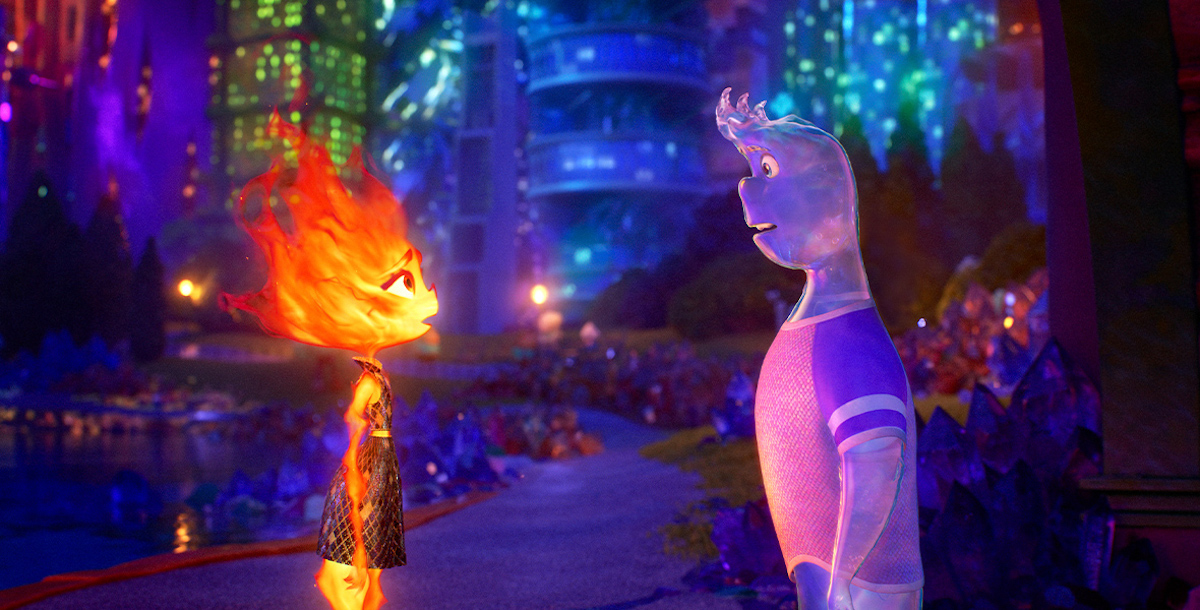Pixar’s ‘Elemental’ is Four Movies in One—and One of Those Movies is Really Interesting
3/5 burning snacks

Pixar has long been known for its high-concept movies. What if ants could talk? Or toys? Or the primal instincts warring for dominance in our brains? Pixar is also known for engrossing speculative stories, like a trash compactor saving humanity or puberty turning you into a giant red panda. Sometimes they manage to do both at once, and the results are transcendent.
Pixar’s newest outing, Elemental, tries to reach the heights of WALL-E, Inside Out or Turning Red, but doesn’t quite get there.
The film starts with an immigrant couple arriving in Element City. Like Disney’s Zootopia, Element City is designed around the wildly different physiologies of its residents—in this case, personifications of earth, air, fire, and water. The movie is careful to show us all the funny ways in which the city accommodates its residents. The air people inflate their own dirigibles, while earth people grow flowers to impress each other. Trains run on canals that gush water everywhere, for reasons that aren’t made super clear.
However, the couple, Bernie (Ronnie del Carmen) and Cinder (Shila Ommi), soon find trouble: fire people aren’t wanted in Element City. Although the story is mainly a metaphor for racism and xenophobia, there’s also a hint of disability critique in there, since Element City wasn’t designed with fire people in mind. For instance, fire people have to carry umbrellas around to protect them from the constantly splashing trains, since a drenching means instant death.
The movie focuses on Ember (Leah Lewis), Bernie and Cinder’s daughter, and her adventures with Wade (Mamoudou Athie), a watery city inspector who’s forced to give her family’s shop a bunch of tickets for leaky pipes. Here’s where the plot gets really confusing, and feels like Pixar tried to cram four movies into one.
First, there’s Ember’s quest to get the tickets canceled. This plot just doesn’t make any sense. It turns out that water service to Firetown was canceled years ago, which means there’s a leak further down the line, and the flooded shop isn’t Ember’s fault. If the entire neighborhood is being threatened with death by flash flood, why is it Ember’s responsibility to fix the problem instead of the city’s? There could be some really interesting commentary on discrimination here, since the city is shirking its responsibility to Firetown and putting its residents in mortal danger, but that gets buried under Ember’s antics with Wade as they try to fix the leak.
The second plot is the Zootopia/Inside Out-esque world-building. What would it look like if the four elements were people, all trying to live together in a metropolis? It turns out three of the elements would gang up against the fourth, and the trains would run on water. Zootopia has a simple enough concept that the city’s tensions and conflicts feel believable, and Inside Out‘s exploration of depression is masterful. In Elemental, though, the concept just doesn’t feel fleshed out.
That’s mainly because the third plot is the Romeo and Juliet-style romance between Ember and Wade, who can’t physically touch because they’ll annihilate each other on contact. If this movie had simply been fire people versus water people, the concept might have worked, but as it is, the earth and air people feel like distractions. There was no reason to cram all four elements into this story.
Then, finally, there’s the immigrant story—and this is where the movie finally does something really interesting. Ember is expected to take over the family business and marry a fellow fire person. Wade comes from a family whose members are privileged enough to bum around and follow their bliss. Ember’s situation is messy and complicated, and that’s what makes it so compelling. The glimpses we get of Fireland culture (I’m so glad they went with that simple country name, instead of, I don’t know, Smolderia or something), are vivid and believable. Wade’s family commits an excruciating series of microaggressions against Ember, but they mean well and try to do better. It’s clear that this is the story the filmmakers wanted to tell.
Elemental is, like most recent Pixar films, fine. If the studio would only throw the gimmicks out the window and focus on good stories, though, it might go back to making the phenomenal films that it’s known for.
(featured image: Walt Disney Studios Motion Pictures)
Have a tip we should know? [email protected]
